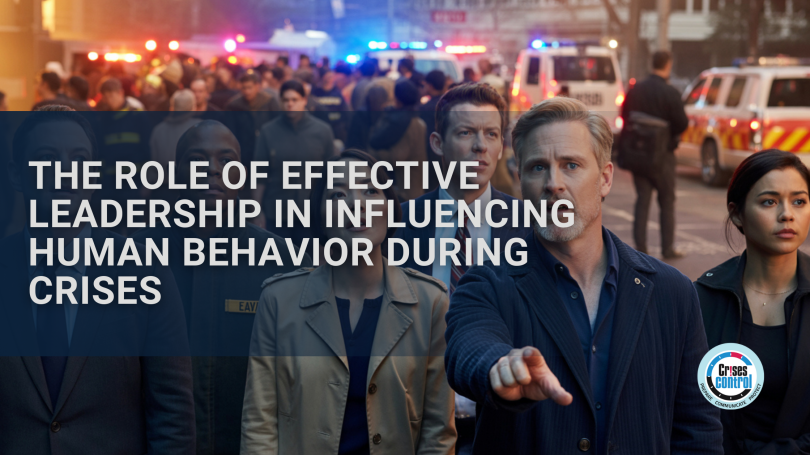Crises are a fact of life. They can be natural disasters, accidents, or man-made events. When a crisis hits, it can cause widespread fear, uncertainty, and chaos. In these moments, it is more important than ever for leaders to step up and provide clear and concise guidance.
Picture this – your organisation is in the midst of a crisis, tensions run high, and chaos looms. What do you do? How do you ensure that your team makes the right decisions and stays resilient? These crises disrupt operations, challenge decision-making, and threaten the very existence of organisations. In the turbulent seas of a crisis, effective leadership is the North Star guiding your ship to safety.
The Power of Influence
Effective leadership during a crisis isn’t about issuing orders from the top-down. It’s about influencing human behaviour, instilling confidence, and empowering your team to act decisively.
Communication is Key
In the heart of a crisis, communication can be your most potent weapon. Leaders must adopt a transparent and timely communication approach. Why? Because trust is the currency that keeps anxiety at bay. Effective communication helps in crisis comprehension, decision-making, and reducing fear. Transparency fosters trust, ensuring that your team knows you’re navigating the storm together.
Foster Business Continuity
In the midst of chaos, business continuity becomes your lodestar. A leader’s responsibility is to ensure that essential operations continue seamlessly. A robust business continuity plan is not just a checklist; it’s your lifeline. Identify critical functions, have backup systems in place, and ensure everyone knows their role in executing the plan.
Leading by Example
Leadership isn’t about never feeling fear; it’s about feeling fear and standing firm. When a leader panics, the team may follow suit. Conversely, when a leader stays composed, it can have a stabilising effect.
Stay Calm and Collected
Leaders should equip themselves with crisis management training to stay calm under pressure. This composure can be contagious and reassure the team. In the midst of a crisis, quick and informed decisions are the need of the hour. Effective leaders make these decisions with clarity and precision.
Decisiveness Wins
Leaders should encourage their teams to make decisive decisions. Weighing the pros and cons swiftly and choosing the best course of action is paramount.
Motivating and Empowering Teams During Crises
Be the Beacon of Hope
Leaders should inspire hope and confidence in their teams. Reassure employees that the organisation has a plan in place, and together, you will overcome the crisis.
Empowered employees can take ownership of their roles in crisis management. Leaders should encourage employees to take initiative and contribute to the resolution.
Trust Your Team
Leaders should trust their teams to make the right decisions when needed. Empowering employees fosters a sense of responsibility and ownership.
Leveraging Crisis Management Tools for Enhanced Leadership
In today’s digital age, leaders have a powerful ally in their quest for effective crisis management – specialised crisis management tools. These tools are designed to bolster leadership efforts and equip organisations with the capabilities needed to navigate crises successfully. Let’s explore the invaluable contributions they bring to the table.
- Real-time Information: Crisis management tools provide leaders with real-time data and insights. This access to up-to-the-minute information empowers leaders to make informed decisions promptly. With a clear understanding of the crisis’s scope and impact, leaders can devise well-thought-out strategies.
- Communication Hub: Effective communication is paramount during a crisis. Crisis management tools often serve as centralised communication hubs, enabling leaders to disseminate information rapidly to teams, stakeholders, and the public. This ensures that everyone is on the same page and minimises confusion.
- Streamlined Coordination: Coordinating various aspects of crisis response can be challenging. These tools streamline the coordination process, making it easier for leaders to assign tasks, monitor progress, and allocate resources where needed. This level of organisation is instrumental in managing crises efficiently.
- Documentation and Analysis: Post-crisis analysis is essential for learning and improving future responses. Many crisis management tools offer robust documentation features, allowing leaders to record actions taken and their outcomes. This data can be invaluable for post-crisis evaluations and planning.
- Scalability: Crises can vary significantly in scale. Whether it’s a minor disruption or a major catastrophe, these tools are scalable to meet the needs of the situation. Leaders can adapt their crisis management approach accordingly.
- Training and Preparedness: These tools often come with training modules and preparedness features. Leaders can use them to educate their teams and ensure everyone knows their roles and responsibilities in advance of a crisis.
While effective leadership remains the cornerstone of crisis management, these tools serve as indispensable companions, amplifying leadership efforts and enhancing an organisation’s overall readiness to tackle any crisis that comes its way.
Conclusion
In times of crisis, effective leadership can be the linchpin in influencing human behaviour for the better. Leaders who excel in communication, remain calm under pressure, and motivate and empower their teams will guide their organisations towards successful crisis resolution.
Don’t leave your organisation’s response to chance. Request a live demo of Crises Control today to see how our comprehensive crisis management solution can empower your leadership and teams to respond effectively in any situation. Get in touch with our experts to learn more. Your journey to crisis readiness begins here with Crises Control.







